Corporate Social Responsibility Reporting: Analysis and Examples
VerifiedAdded on 2022/11/13
|7
|1208
|194
Report
AI Summary
This report provides an analysis of the significance of corporate social responsibility (CSR) in various organizations. It examines the reasons behind the adoption of CSR reporting by companies, linking it to sustainability pillars (environmental, social, and economic) and its impact on financial statements. The report discusses how CSR reporting enhances stakeholder relationships, mitigates cultural differences, and addresses social and environmental factors. Several companies like European Investment Bank, Patagonia, Nike, Pearson, and Unilever are used as examples to highlight their contributions to CSR, including their sustainability reports and strategies. The report concludes by emphasizing the growing importance of CSR in the business world and the trend of incorporating sustainability into financial reporting, supported by relevant references.
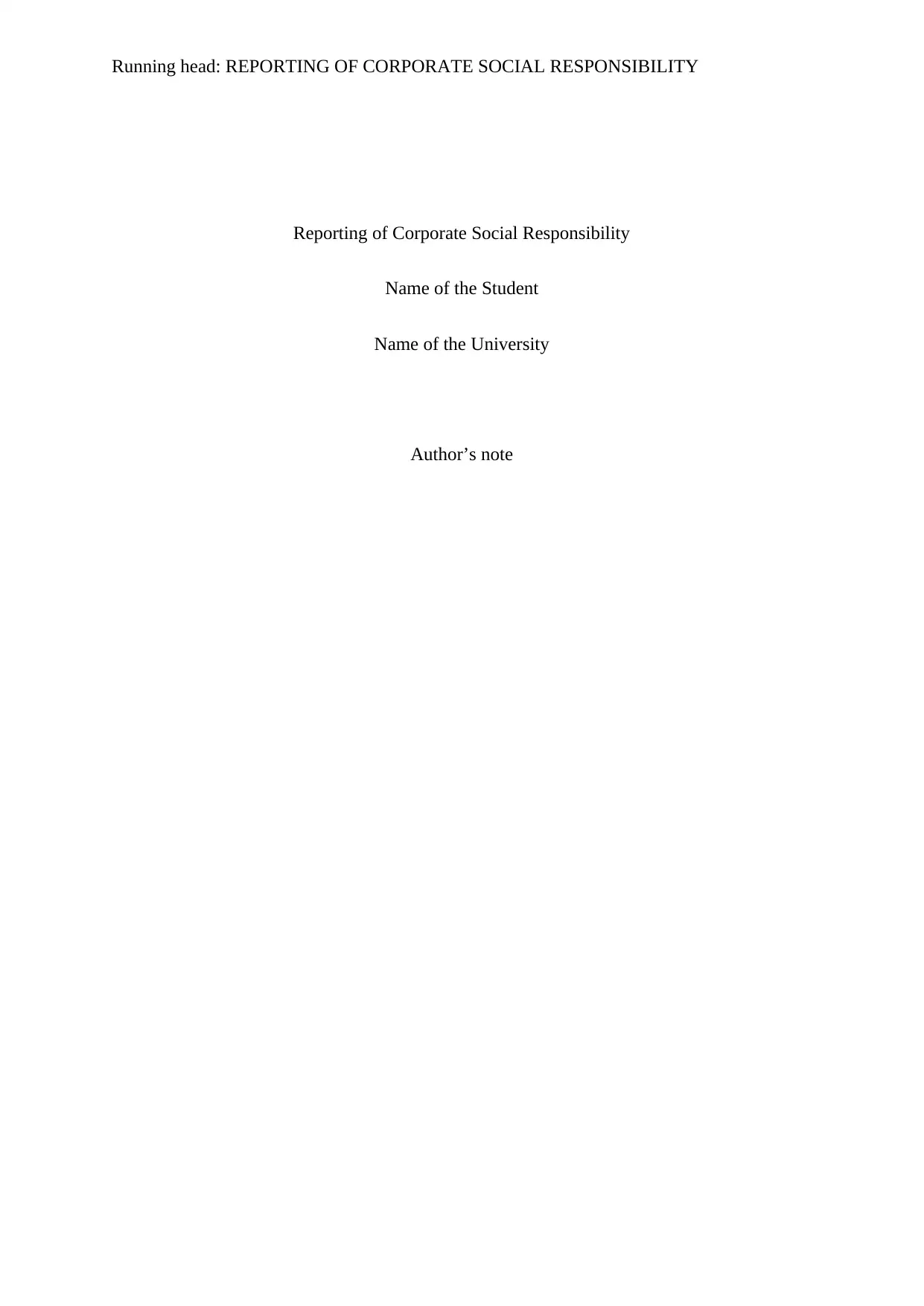
Running head: REPORTING OF CORPORATE SOCIAL RESPONSIBILITY
Reporting of Corporate Social Responsibility
Name of the Student
Name of the University
Author’s note
Reporting of Corporate Social Responsibility
Name of the Student
Name of the University
Author’s note
Paraphrase This Document
Need a fresh take? Get an instant paraphrase of this document with our AI Paraphraser
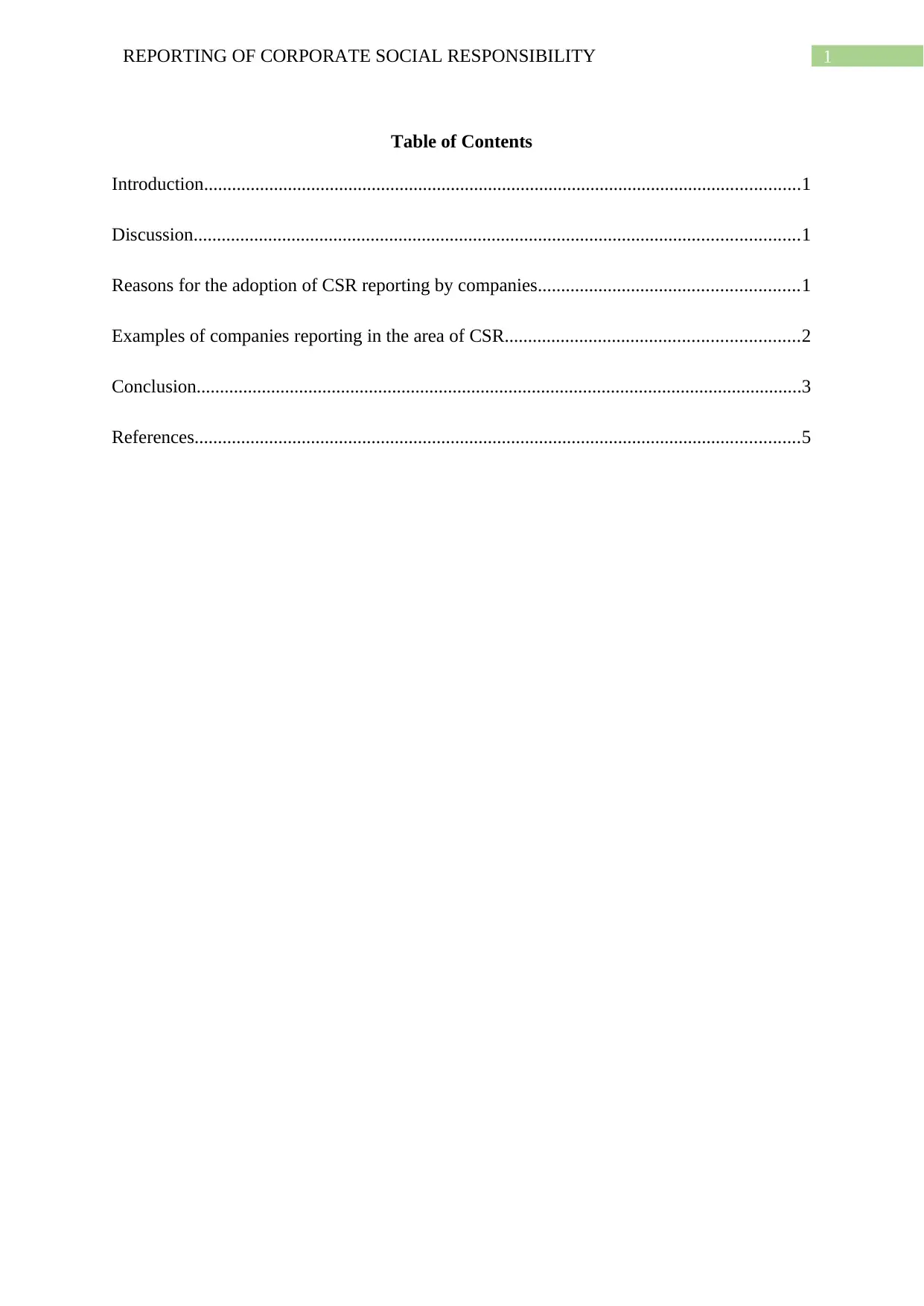
1REPORTING OF CORPORATE SOCIAL RESPONSIBILITY
Table of Contents
Introduction................................................................................................................................1
Discussion..................................................................................................................................1
Reasons for the adoption of CSR reporting by companies........................................................1
Examples of companies reporting in the area of CSR...............................................................2
Conclusion..................................................................................................................................3
References..................................................................................................................................5
Table of Contents
Introduction................................................................................................................................1
Discussion..................................................................................................................................1
Reasons for the adoption of CSR reporting by companies........................................................1
Examples of companies reporting in the area of CSR...............................................................2
Conclusion..................................................................................................................................3
References..................................................................................................................................5
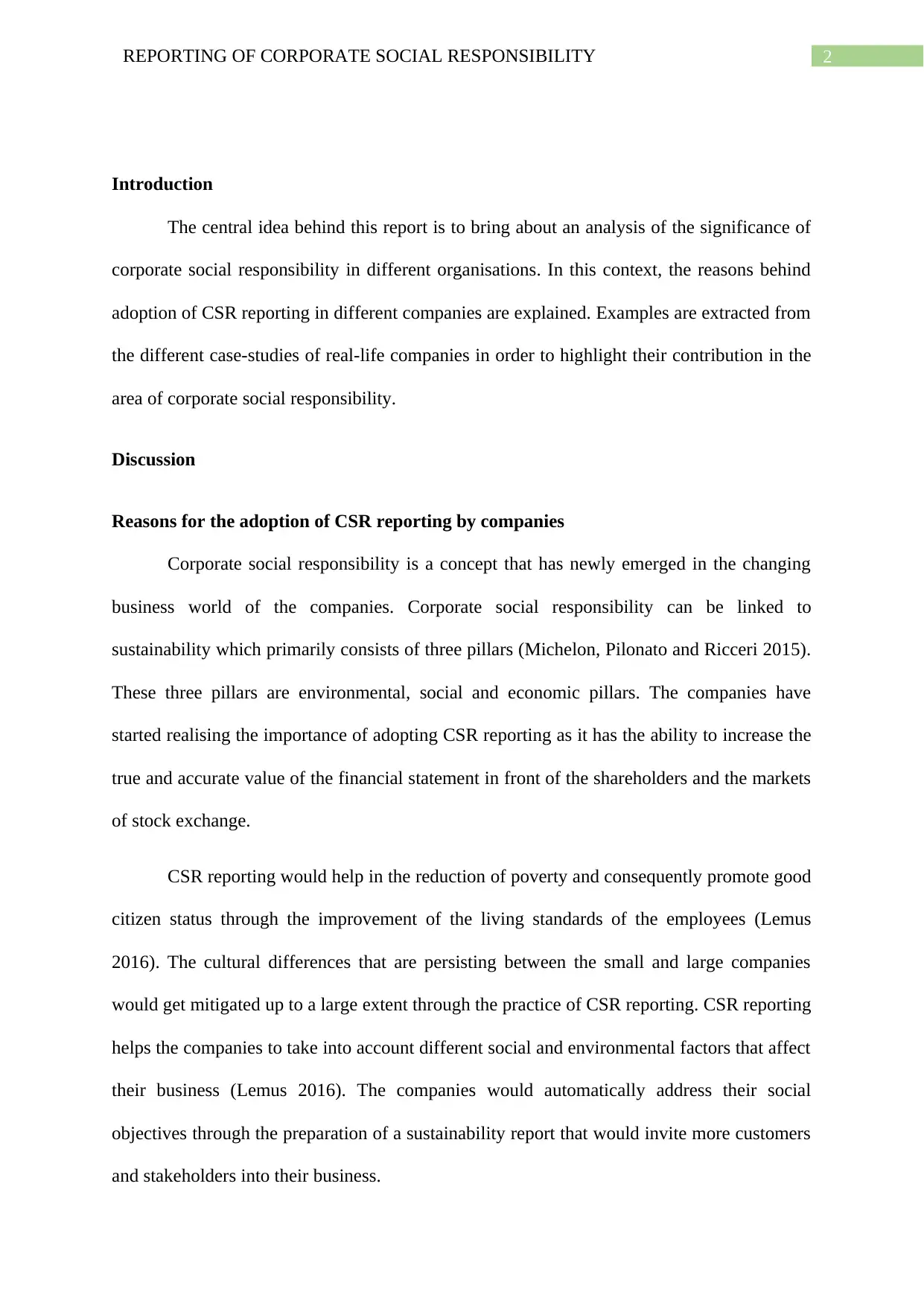
2REPORTING OF CORPORATE SOCIAL RESPONSIBILITY
Introduction
The central idea behind this report is to bring about an analysis of the significance of
corporate social responsibility in different organisations. In this context, the reasons behind
adoption of CSR reporting in different companies are explained. Examples are extracted from
the different case-studies of real-life companies in order to highlight their contribution in the
area of corporate social responsibility.
Discussion
Reasons for the adoption of CSR reporting by companies
Corporate social responsibility is a concept that has newly emerged in the changing
business world of the companies. Corporate social responsibility can be linked to
sustainability which primarily consists of three pillars (Michelon, Pilonato and Ricceri 2015).
These three pillars are environmental, social and economic pillars. The companies have
started realising the importance of adopting CSR reporting as it has the ability to increase the
true and accurate value of the financial statement in front of the shareholders and the markets
of stock exchange.
CSR reporting would help in the reduction of poverty and consequently promote good
citizen status through the improvement of the living standards of the employees (Lemus
2016). The cultural differences that are persisting between the small and large companies
would get mitigated up to a large extent through the practice of CSR reporting. CSR reporting
helps the companies to take into account different social and environmental factors that affect
their business (Lemus 2016). The companies would automatically address their social
objectives through the preparation of a sustainability report that would invite more customers
and stakeholders into their business.
Introduction
The central idea behind this report is to bring about an analysis of the significance of
corporate social responsibility in different organisations. In this context, the reasons behind
adoption of CSR reporting in different companies are explained. Examples are extracted from
the different case-studies of real-life companies in order to highlight their contribution in the
area of corporate social responsibility.
Discussion
Reasons for the adoption of CSR reporting by companies
Corporate social responsibility is a concept that has newly emerged in the changing
business world of the companies. Corporate social responsibility can be linked to
sustainability which primarily consists of three pillars (Michelon, Pilonato and Ricceri 2015).
These three pillars are environmental, social and economic pillars. The companies have
started realising the importance of adopting CSR reporting as it has the ability to increase the
true and accurate value of the financial statement in front of the shareholders and the markets
of stock exchange.
CSR reporting would help in the reduction of poverty and consequently promote good
citizen status through the improvement of the living standards of the employees (Lemus
2016). The cultural differences that are persisting between the small and large companies
would get mitigated up to a large extent through the practice of CSR reporting. CSR reporting
helps the companies to take into account different social and environmental factors that affect
their business (Lemus 2016). The companies would automatically address their social
objectives through the preparation of a sustainability report that would invite more customers
and stakeholders into their business.
⊘ This is a preview!⊘
Do you want full access?
Subscribe today to unlock all pages.

Trusted by 1+ million students worldwide
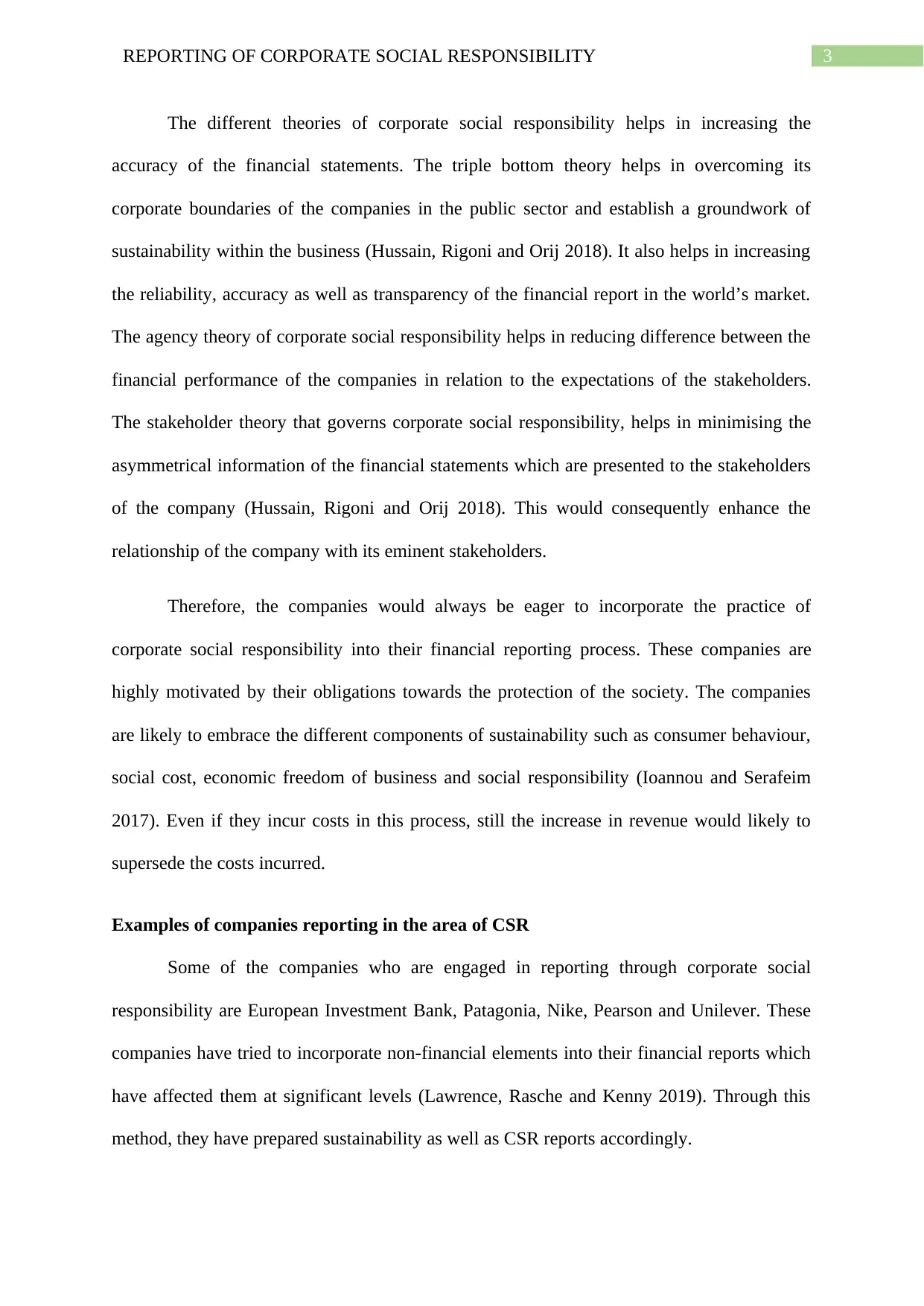
3REPORTING OF CORPORATE SOCIAL RESPONSIBILITY
The different theories of corporate social responsibility helps in increasing the
accuracy of the financial statements. The triple bottom theory helps in overcoming its
corporate boundaries of the companies in the public sector and establish a groundwork of
sustainability within the business (Hussain, Rigoni and Orij 2018). It also helps in increasing
the reliability, accuracy as well as transparency of the financial report in the world’s market.
The agency theory of corporate social responsibility helps in reducing difference between the
financial performance of the companies in relation to the expectations of the stakeholders.
The stakeholder theory that governs corporate social responsibility, helps in minimising the
asymmetrical information of the financial statements which are presented to the stakeholders
of the company (Hussain, Rigoni and Orij 2018). This would consequently enhance the
relationship of the company with its eminent stakeholders.
Therefore, the companies would always be eager to incorporate the practice of
corporate social responsibility into their financial reporting process. These companies are
highly motivated by their obligations towards the protection of the society. The companies
are likely to embrace the different components of sustainability such as consumer behaviour,
social cost, economic freedom of business and social responsibility (Ioannou and Serafeim
2017). Even if they incur costs in this process, still the increase in revenue would likely to
supersede the costs incurred.
Examples of companies reporting in the area of CSR
Some of the companies who are engaged in reporting through corporate social
responsibility are European Investment Bank, Patagonia, Nike, Pearson and Unilever. These
companies have tried to incorporate non-financial elements into their financial reports which
have affected them at significant levels (Lawrence, Rasche and Kenny 2019). Through this
method, they have prepared sustainability as well as CSR reports accordingly.
The different theories of corporate social responsibility helps in increasing the
accuracy of the financial statements. The triple bottom theory helps in overcoming its
corporate boundaries of the companies in the public sector and establish a groundwork of
sustainability within the business (Hussain, Rigoni and Orij 2018). It also helps in increasing
the reliability, accuracy as well as transparency of the financial report in the world’s market.
The agency theory of corporate social responsibility helps in reducing difference between the
financial performance of the companies in relation to the expectations of the stakeholders.
The stakeholder theory that governs corporate social responsibility, helps in minimising the
asymmetrical information of the financial statements which are presented to the stakeholders
of the company (Hussain, Rigoni and Orij 2018). This would consequently enhance the
relationship of the company with its eminent stakeholders.
Therefore, the companies would always be eager to incorporate the practice of
corporate social responsibility into their financial reporting process. These companies are
highly motivated by their obligations towards the protection of the society. The companies
are likely to embrace the different components of sustainability such as consumer behaviour,
social cost, economic freedom of business and social responsibility (Ioannou and Serafeim
2017). Even if they incur costs in this process, still the increase in revenue would likely to
supersede the costs incurred.
Examples of companies reporting in the area of CSR
Some of the companies who are engaged in reporting through corporate social
responsibility are European Investment Bank, Patagonia, Nike, Pearson and Unilever. These
companies have tried to incorporate non-financial elements into their financial reports which
have affected them at significant levels (Lawrence, Rasche and Kenny 2019). Through this
method, they have prepared sustainability as well as CSR reports accordingly.
Paraphrase This Document
Need a fresh take? Get an instant paraphrase of this document with our AI Paraphraser
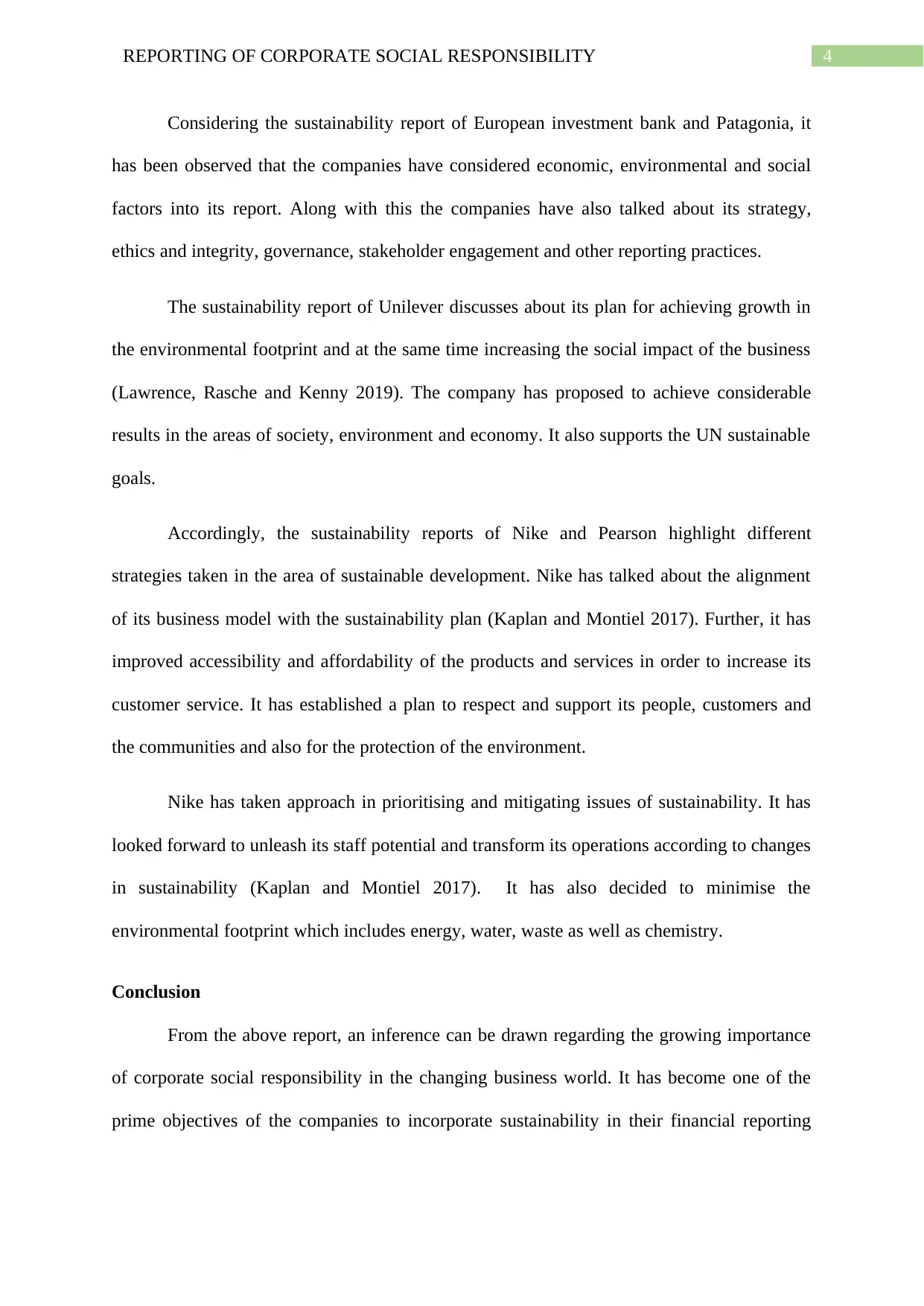
4REPORTING OF CORPORATE SOCIAL RESPONSIBILITY
Considering the sustainability report of European investment bank and Patagonia, it
has been observed that the companies have considered economic, environmental and social
factors into its report. Along with this the companies have also talked about its strategy,
ethics and integrity, governance, stakeholder engagement and other reporting practices.
The sustainability report of Unilever discusses about its plan for achieving growth in
the environmental footprint and at the same time increasing the social impact of the business
(Lawrence, Rasche and Kenny 2019). The company has proposed to achieve considerable
results in the areas of society, environment and economy. It also supports the UN sustainable
goals.
Accordingly, the sustainability reports of Nike and Pearson highlight different
strategies taken in the area of sustainable development. Nike has talked about the alignment
of its business model with the sustainability plan (Kaplan and Montiel 2017). Further, it has
improved accessibility and affordability of the products and services in order to increase its
customer service. It has established a plan to respect and support its people, customers and
the communities and also for the protection of the environment.
Nike has taken approach in prioritising and mitigating issues of sustainability. It has
looked forward to unleash its staff potential and transform its operations according to changes
in sustainability (Kaplan and Montiel 2017). It has also decided to minimise the
environmental footprint which includes energy, water, waste as well as chemistry.
Conclusion
From the above report, an inference can be drawn regarding the growing importance
of corporate social responsibility in the changing business world. It has become one of the
prime objectives of the companies to incorporate sustainability in their financial reporting
Considering the sustainability report of European investment bank and Patagonia, it
has been observed that the companies have considered economic, environmental and social
factors into its report. Along with this the companies have also talked about its strategy,
ethics and integrity, governance, stakeholder engagement and other reporting practices.
The sustainability report of Unilever discusses about its plan for achieving growth in
the environmental footprint and at the same time increasing the social impact of the business
(Lawrence, Rasche and Kenny 2019). The company has proposed to achieve considerable
results in the areas of society, environment and economy. It also supports the UN sustainable
goals.
Accordingly, the sustainability reports of Nike and Pearson highlight different
strategies taken in the area of sustainable development. Nike has talked about the alignment
of its business model with the sustainability plan (Kaplan and Montiel 2017). Further, it has
improved accessibility and affordability of the products and services in order to increase its
customer service. It has established a plan to respect and support its people, customers and
the communities and also for the protection of the environment.
Nike has taken approach in prioritising and mitigating issues of sustainability. It has
looked forward to unleash its staff potential and transform its operations according to changes
in sustainability (Kaplan and Montiel 2017). It has also decided to minimise the
environmental footprint which includes energy, water, waste as well as chemistry.
Conclusion
From the above report, an inference can be drawn regarding the growing importance
of corporate social responsibility in the changing business world. It has become one of the
prime objectives of the companies to incorporate sustainability in their financial reporting
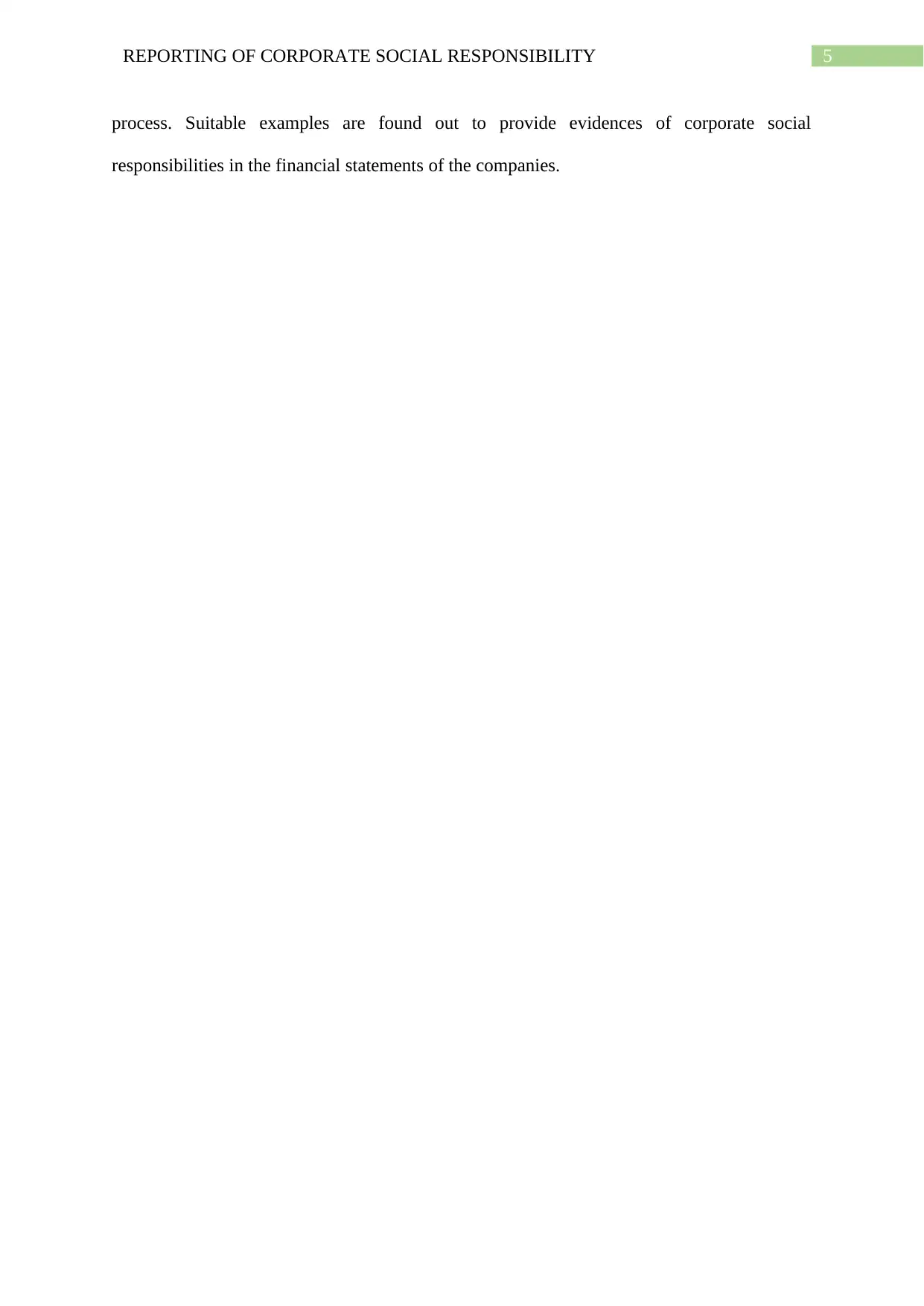
5REPORTING OF CORPORATE SOCIAL RESPONSIBILITY
process. Suitable examples are found out to provide evidences of corporate social
responsibilities in the financial statements of the companies.
process. Suitable examples are found out to provide evidences of corporate social
responsibilities in the financial statements of the companies.
⊘ This is a preview!⊘
Do you want full access?
Subscribe today to unlock all pages.

Trusted by 1+ million students worldwide
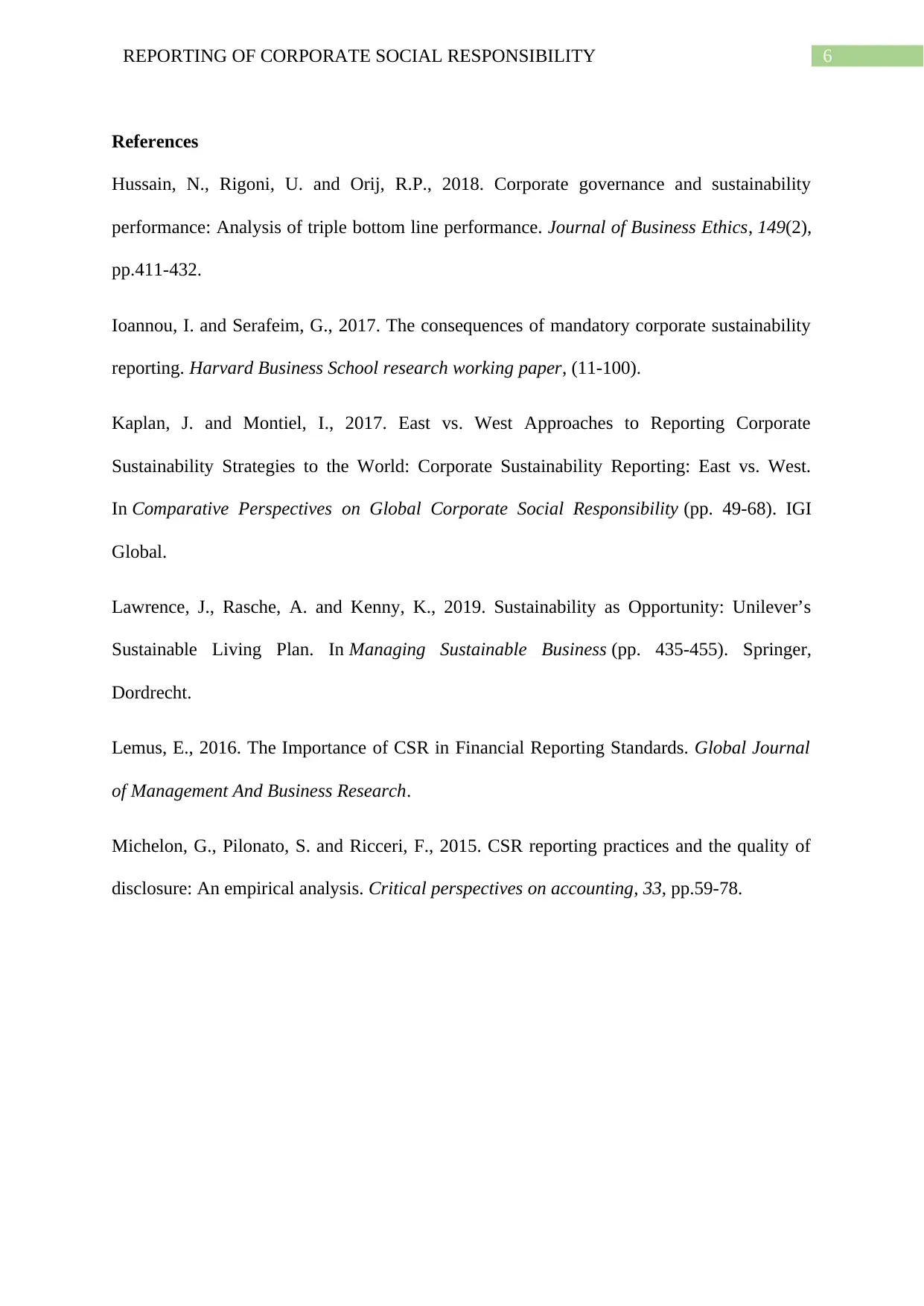
6REPORTING OF CORPORATE SOCIAL RESPONSIBILITY
References
Hussain, N., Rigoni, U. and Orij, R.P., 2018. Corporate governance and sustainability
performance: Analysis of triple bottom line performance. Journal of Business Ethics, 149(2),
pp.411-432.
Ioannou, I. and Serafeim, G., 2017. The consequences of mandatory corporate sustainability
reporting. Harvard Business School research working paper, (11-100).
Kaplan, J. and Montiel, I., 2017. East vs. West Approaches to Reporting Corporate
Sustainability Strategies to the World: Corporate Sustainability Reporting: East vs. West.
In Comparative Perspectives on Global Corporate Social Responsibility (pp. 49-68). IGI
Global.
Lawrence, J., Rasche, A. and Kenny, K., 2019. Sustainability as Opportunity: Unilever’s
Sustainable Living Plan. In Managing Sustainable Business (pp. 435-455). Springer,
Dordrecht.
Lemus, E., 2016. The Importance of CSR in Financial Reporting Standards. Global Journal
of Management And Business Research.
Michelon, G., Pilonato, S. and Ricceri, F., 2015. CSR reporting practices and the quality of
disclosure: An empirical analysis. Critical perspectives on accounting, 33, pp.59-78.
References
Hussain, N., Rigoni, U. and Orij, R.P., 2018. Corporate governance and sustainability
performance: Analysis of triple bottom line performance. Journal of Business Ethics, 149(2),
pp.411-432.
Ioannou, I. and Serafeim, G., 2017. The consequences of mandatory corporate sustainability
reporting. Harvard Business School research working paper, (11-100).
Kaplan, J. and Montiel, I., 2017. East vs. West Approaches to Reporting Corporate
Sustainability Strategies to the World: Corporate Sustainability Reporting: East vs. West.
In Comparative Perspectives on Global Corporate Social Responsibility (pp. 49-68). IGI
Global.
Lawrence, J., Rasche, A. and Kenny, K., 2019. Sustainability as Opportunity: Unilever’s
Sustainable Living Plan. In Managing Sustainable Business (pp. 435-455). Springer,
Dordrecht.
Lemus, E., 2016. The Importance of CSR in Financial Reporting Standards. Global Journal
of Management And Business Research.
Michelon, G., Pilonato, S. and Ricceri, F., 2015. CSR reporting practices and the quality of
disclosure: An empirical analysis. Critical perspectives on accounting, 33, pp.59-78.
1 out of 7
Related Documents
Your All-in-One AI-Powered Toolkit for Academic Success.
+13062052269
info@desklib.com
Available 24*7 on WhatsApp / Email
![[object Object]](/_next/static/media/star-bottom.7253800d.svg)
Unlock your academic potential
Copyright © 2020–2025 A2Z Services. All Rights Reserved. Developed and managed by ZUCOL.





